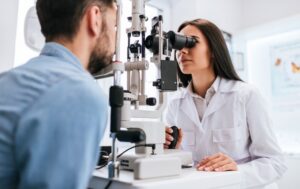To coincide with National Eye Health Week which takes place between 18-24 September 2023, Clair Weston at uvex, takes a look at the essential role of Dispensing Opticians in ensuring workers get the right prescription safety glasses.
Dispensing Opticians (DOs) play a key role in ensuring workers have access to prescription eyewear that delivers optimal protection and comfort.
Sight is indispensable. Safety eyewear is therefore essential PPE for those working with hazards that pose a threat to the eyes including chemicals, metals, dust, projectile objects, vapour, heat and ultraviolet radiation.
 Quality protection is paramount, but wearability cannot be overlooked. One size does not fit all, with individual fit, comfort, product performance and style all key to compliance. To encourage people to wear safety eyewear over long periods, eyewear must be capable of adapting to individual head shapes whilst ensuring a pressure-free fit and providing total eye protection.
Quality protection is paramount, but wearability cannot be overlooked. One size does not fit all, with individual fit, comfort, product performance and style all key to compliance. To encourage people to wear safety eyewear over long periods, eyewear must be capable of adapting to individual head shapes whilst ensuring a pressure-free fit and providing total eye protection.
Around a quarter of the population requires prescription lenses. For these workers, DOs play an essential role in ensuring they get the safety glasses they need. DOs are registered healthcare professionals who can advise customers on how to select and maintain their spectacles. They also serve as the first point of contact when a customer is experiencing difficulties with their vision or spectacles.
Crisp and clear vision
The Opticians Act 1989 allows any competent individual to sell prescription eyewear in the UK providing the customer is above 16 and not registered as sight impaired or severely sight impaired. However, it is clearly in workers’ best interests to seek out a DO.
To enjoy the best possible vision, the right lenses are as important as the right prescription. Poorly fitted frames are not only uncomfortable but can affect the quality of your vision too.
During the dispensing appointment, an optician ensures a customer’s vision is crisp and clear.
DOs will make adjustments so the frames fit the user’s face precisely, because everyone’s face is shaped a bit differently. This not only maximises comfort but also ensures they remain in the correct position for optimal vision.
DOs will also take head tilts or squints into account when deciding where the lenses’ optical centre should be placed. They can provide expert advice on addressing eye conditions such as dry eye, too, and carry out eye tests that can reveal the early indicators for diseases such as glaucoma, diabetes and cataracts.
This means PPE providers who do not work with DOs cannot guarantee the quality, useability and wearability of their spectacles.
At uvex, we believe that eyes are too important to take any chances and work alongside both national and independent dispensing opticians throughout the country to ensure workers can easily access safety prescription eyewear.
To find your nearest uvex DO, click here.
What makes us susceptible to burnout?
In this episode of the Safety & Health Podcast, ‘Burnout, stress and being human’, Heather Beach is joined by Stacy Thomson to discuss burnout, perfectionism and how to deal with burnout as an individual, as management and as an organisation.
We provide an insight on how to tackle burnout and why mental health is such a taboo subject, particularly in the workplace.

 Quality protection is paramount, but wearability cannot be overlooked. One size does not fit all, with individual fit, comfort, product performance and style all key to compliance. To encourage people to wear safety eyewear over long periods, eyewear must be capable of adapting to individual head shapes whilst ensuring a pressure-free fit and providing total eye protection.
Quality protection is paramount, but wearability cannot be overlooked. One size does not fit all, with individual fit, comfort, product performance and style all key to compliance. To encourage people to wear safety eyewear over long periods, eyewear must be capable of adapting to individual head shapes whilst ensuring a pressure-free fit and providing total eye protection.
You are having a Giraffe suggesting PPE Screen Glasses for Display Screen Operators as, like, you know, “shutting the stable door after the horse has bolted”…
In order to qualify for free, so called, PPE Screen Glasses you have to be diagnosed with vision loss in the first place and, the PPE glasses are just prosthetic to compensate or mitigate the progression of the “visual repetitive stress injury” 58% of operators suffer let alone the other MSD’s, WRULD’s or MSK’s.
Expediently ignoring Accessibility Regulations effectively contributory negligence !?
https://www.hse.gov.uk/research/rrpdf/rr561.pdf
https://icd.who.int/browse10/2016/en#/H53.1
https://www.youtube.com/watch?v=2C1jmwGIsGQ&list=PLezLOQBs0kcn1kCE3A_Jr5eShBiLu3kKy&index=4